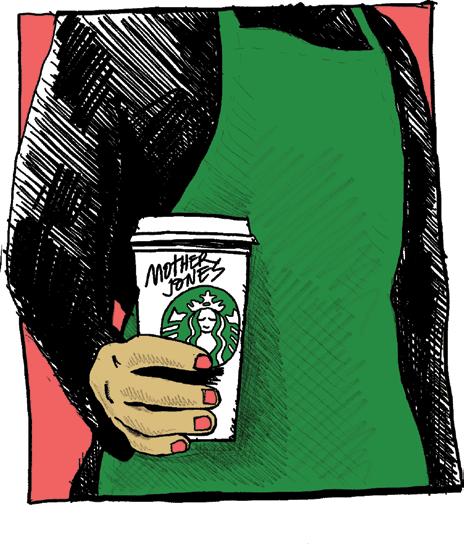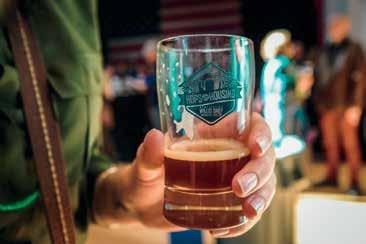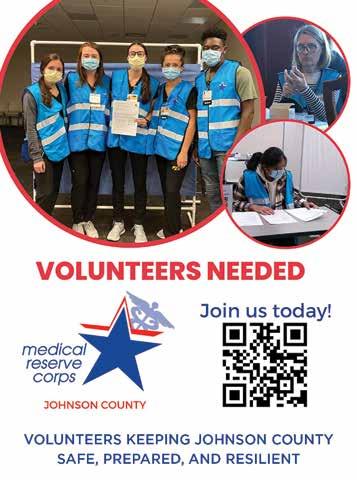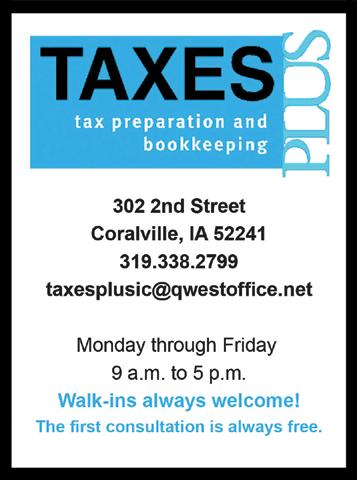
5 minute read
Full Steam Ahead
Iowa City baristas become the first in the state to subvert Starbucks Corporate’s anti-union culture.
BY MIKE KUHLENBECK
Advertisement
Baristas and supervisors at the Iowa City Burlington and Clinton Starbucks store made history on March 27, filing a petition to the National Labor Relations Board (NLRB) to form a union. They join the ranks of thousands of workers demanding their voices be heard by executives of the Seattlebased coffee chain. If they succeed, they will become the first unionized Starbucks store in Iowa.
Affectionately known in labor circles as “The Wobblies,” the Industrial Workers of the World (IWW) attempted to unionize Starbucks stores as early as 2004. While those efforts did not result in unionization, it highlighted the struggles of Starbucks workers which continue nearly 20 years later.
“I think a lot of people wonder why Starbucks workers need a union, and the answer is that I see how hard my coworkers work every day, and they still aren’t able to cover rent or pay their bills,” Abi Scheppman, shift supervisor and member of the organizing committee for filing for a union, told Little Village in an email. “I see these people every day. I know how amazing they are, I know that they deserve to be valued as people and not just cogs in a machine for Starbucks to make more profit.”
The troubles with Starbucks as an international franchise have been brewing for decades, along with the discontent of their workers (referred to as “partners” by the company) during increasingly unstable economic times.
Based on interviews with the BurlingtonClinton store partners conducted by Little Village, workers share similar concerns as their partners at other stores around the country: worker and customer safety, understaffing, low wages and lack of communication with management and the company.
“We are really just looking for more equitable treatments as a store,” Everlynn Roberts, a member of the organizing committee, said in an email. “We make a lot of money for Starbucks and our hard work isn’t always reflected in our pay, our benefits, and how higher-ups respond to us as baristas.” has worked for Starbucks since May 2020, joining the staff of the Burlington-Clinton location in June 2021 before becoming a shift supervisor in November that same year. She says partners want more recognition for the work they do, and proper responses to problems within the store.
“There have been a few situations in the past few months where us as a store have tried to take safety precautions due to biohazard exposure or active shooters on campus, but management had instead instructed us to remain open despite our concerns,” Roberts said. “Basically, we’re just looking for more of a voice within the company, especially where our store is concerned. We are the ones that work here, and we know what is best for us and what our needs are.”
Raised in Clive, UI student Molly Belvo started as a Starbucks barista in May 2021 at a store in West Des Moines, where she returns to work during long school breaks. She started at the Burlington-Clinton Starbucks in August 2021.
“The main things we want to be addressed are our wages, safety of ourselves and customers, a functioning and efficient work space, and guaranteeing our benefits, among other things,” Belvo explained. “Each partner has their own reasons for supporting this effort, but we all just want to be heard when we voice concern and support for the things that happen while we’re at work.”
In order to file for unionization, only 30 percent of workers need to sign union cards. The Burlington-Clinton workers made sure at least 70 percent of partners signed cards to better their chances winning a union election and recognition by the company.
The news was greeted with “excitement, and support from members of the Iowa, Iowa City, and University of Iowa communities,” according to Belvo.
“So far we haven’t really seen any retaliation,” Roberts said. “But it is still early and we will probably have a lot of waiting before we see an election.”
Almost a week before Burlington-Clinton workers made the announcement, Starbucks workers in over a hundred cities participated in a one-day strike on March 22, including a march outside the company’s headquarters. The strike was scheduled to coincide with “Founders’ Day,” a kind of corporate hero’s send-off for the outgoing Starbucks CEO, Howard Schultz, one day before the annual shareholder meeting—which reportedly ended with union filings from seven stores.
Despite retiring from the company in 2018, Schultz rejoined Starbucks as interim chief executive officer and a member of the company’s Board of Directors on April 4, 2022. He stepped down from this position on March 20 and has been replaced by Laxman Narasimhan as CEO.
“I think with how many Starbucks have been unionizing recently, people are becoming less scared of what it could mean for the workplace, becoming more informed about what a union is and why businesses will try to union-bust,” Roberts said. “I think a lot of us here at Starbucks have really learned a lot for ourselves and are informed, and so I really believe that my coworkers will make the right choice when we vote.”
Since the Starbucks Workers United (SWU) national union drive was launched as a grassroots effort by rank and file workers in the summer of 2021, there are now nearly 300 unionized Starbucks stores in at least 42 states and the District of Columbia.
The company has been merciless in crushing past union efforts, using high-pressured threats and other scare tactics. SWU reports at least 200 Starbucks union leaders have been fired and several stores shuttered due to pro-union activity.
The Economic Policy Institute reports that large employers such as Starbucks collectively spend roughly $433 million a year on anti-union consulting firms, a large sum considering the same employers claim that raising workers’ pay will somehow endanger their business.
NLRB judge Michael A. Rosas ruled that Starbucks engaged in “egregious widespread conduct demonstrating a general disregard for the employees’ fundamental rights,” citing hundreds of federal labor law violations at one Buffalo, New York store alone. The NLRB has issued 80 official complaints against Starbucks, citing over 1,400 violations of federal labor law across the U.S.
Under subpoena by Congress, Schultz testified before the U.S. Senate Health, Education, Labor and Pensions Committee on March 29, initiated by Sen. Bernie Sanders. Schultz downplayed his role in shaping the company’s anti-union policies.
As this magazine goes to print, Scheppmann said some partners have already reported an increased presence from management in the Iowa City store. However, Belvo said she and her partners have been trained on what to expect when the company reaches out to the unionizing workers, and how to respond.







“There have been conversations about unionizing with every partner in the store, and the vast majority of us support the effort and no one opposed,” Belvo said. “I have no doubt that our effort will be successful. I hope that Starbucks will start doing better about recognizing union efforts, especially with the Senate hearings.”
The Iowa Federation of Labor, AFL-CIO and other organizations are part of the pro-labor coalition urging Congress to pass the Richard L. Trumka Protecting the Right to Organize Act and the No Tax Breaks for Union-Busting Act to better protect workers’ rights and help squash union-busting campaigns.
“I’m really excited, and I hope this inspires other baristas and supervisors to reach out about unionizing their stores too,” Roberts said. “The power belongs in the hands of the workers, the people who are putting in the hours and know the day to day of the job. These are the people who should be making decisions.”




prairie pop







